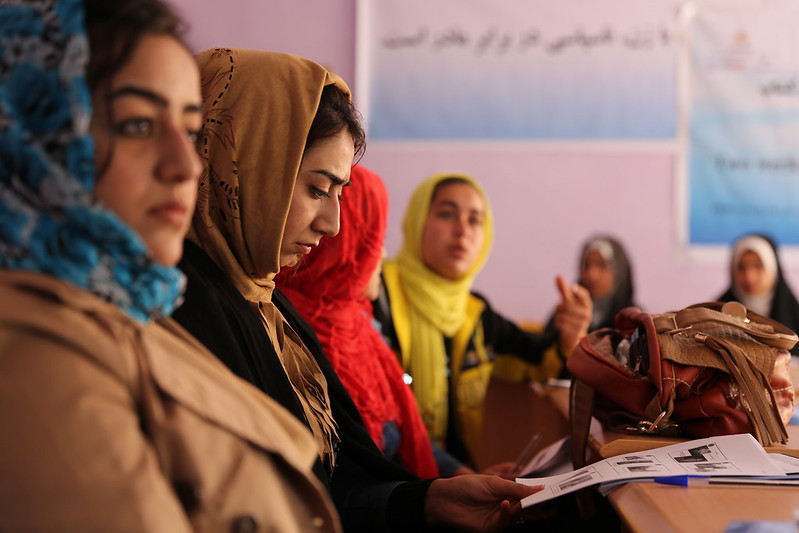E-Commerce Connects Afghan Women Entrepreneurs to the Global Market
 In 2020, 47.3% of Afghanistan’s population lived below the national poverty line. Poverty in the country increased sharply over the last decade due to a stalled economy and the rise of Taliban insurgency. It left almost 90% of Afghans struggling to live and unable to support their families with their current income. This combined effect of stagnating economic growth and deteriorating security resulted in poverty hitting record-breaking heights. The high poverty rate is especially dire for Afghan women. However, e-commerce is providing Afghan women entrepreneurs the opportunity to join the global market and push their communities out of poverty.
In 2020, 47.3% of Afghanistan’s population lived below the national poverty line. Poverty in the country increased sharply over the last decade due to a stalled economy and the rise of Taliban insurgency. It left almost 90% of Afghans struggling to live and unable to support their families with their current income. This combined effect of stagnating economic growth and deteriorating security resulted in poverty hitting record-breaking heights. The high poverty rate is especially dire for Afghan women. However, e-commerce is providing Afghan women entrepreneurs the opportunity to join the global market and push their communities out of poverty.
History of Female Entrepreneurs in Afghanistan
Women suffered deeply during Afghanistan’s almost 40-year war. They ferociously and tirelessly fought for gender equality. During the Taliban regime from 1906 to 2001, women were denied access to basic rights such as education, employment, freedom of movement and healthcare. Essentially, women were either invisible in public life or subjected to continuous violence. After 2001, female activists achieved significant legislative progress. However, the patriarchal structures, religious fundamentalism, the Taliban’s remaining rhetoric and the all-prevailing insecurity of the nation still shape the country and hinder the progress toward equality.
The Successes of Online Commerce
Despite poverty, corruption and political instability, Afghan women all over the country found a way to break away from their conservative society through digital advancements. One of the ways women entered into the world of business was through the Afghan e-commerce site Click.af. Founded in 2016 by Masiullah Stanikzai, Click.af provides Afghans access to a domestic online market. The site started shipping globally last year. The main reason behind the expansion was to connect local designers and artisans to a larger base of consumers around the world. It also promoted Afghan-made products. When sellers register on Click.af, they can find technology, tools and infrastructure to help them grow and succeed. The elements include customer management, marketing and sales tools to manage consumers while showing their presence online and boost sales.
Real Stories of Female-run Businesses
Click.af inspires young women to be entrepreneurs. Currently, the e-commerce platform has enabled 45 Afghan women entrepreneurs to launch their own small businesses. One of these women is 25-year-old Maryam Yousufi, who launched the fashion line called Machum. Yousufi’s brand focuses on designing clothes that fuse Western style with traditional Afghan designs. Yousufi’s dream was to see her products reach global markets. She believes online platforms can give others a chance to try entrepreneurship and overcome conservative attitudes toward women. Through Click.af she was able to receive a credit to start a business.
Women entrepreneurs, especially those in the sector of social entrepreneurship, often disrupt patterns of gender inequality. They reshape dominant expectations, norms and stigmas. According to the World Economic Forum, Yousufi couldn’t even dare to believe that one day she would be able to sew clothes. Yousufi is now designing and selling clothes. According to Yousufi, the opportunity she found through e-commerce allowed her to make decisions in a country where others usually made decisions for her. Click.af is about selling and connecting, but it also shows Afghan women entrepreneurs that they have the right to choose a path for themselves.
Advances for Women Entrepreneurs
E-commerce is a powerful tool that is capable of bringing great benefits to female entrepreneurs. It challenges the old barriers of geographic isolation and restricted access to information and financing. Thanks to the expansion of e-commerce, people in Afghanistan today can shop with full information. They now have the knowledge of the pros and cons of the products instead of relying on word-to-mouth. E-commerce platforms, including Click.af, have also made it possible for shops to open 24/7. This resulted in a meaningful increase in sales for local sellers. More importantly, e-commerce is a necessity in Afghanistan since COVID-19 reached the country and mobility was consequently limited. During the lockdown, while most physical stores and public companies closed, online retailers were able to operate without violating social distance regulations.
Looking Forward
Although e-commerce ventures in Afghanistan still struggle to flourish due to issues such as security issues, capital investments and online payments, there is no doubt that online shopping will exponentially increase its presence in the next few years. Platforms similar to Click.af provide an important opportunity for Afghanistan’s war-torn economy, and more specifically, it demonstrates how empowering female social entrepreneurs is key for the country’s economic recovery. Click.af has been able to reframe the definition of success in a more inclusive manner, which includes and celebrates Afghan women who, against all odds, are taking a chance and jumping into entrepreneurship.
– Alejandra del Carmen Jimeno
Photo: Flickr
